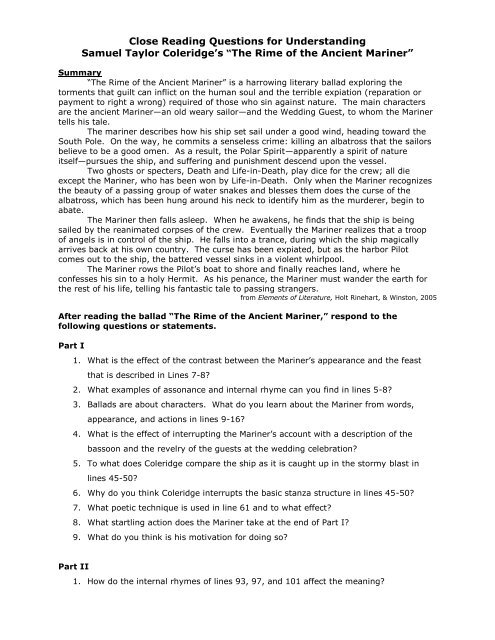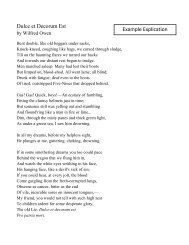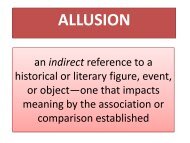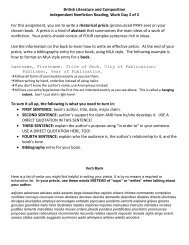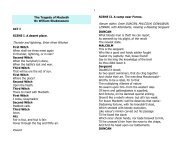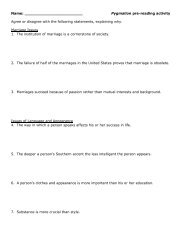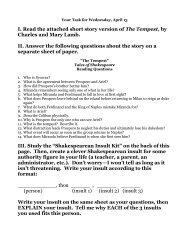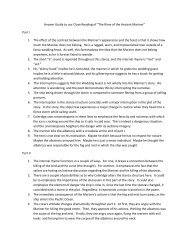You also want an ePaper? Increase the reach of your titles
YUMPU automatically turns print PDFs into web optimized ePapers that Google loves.
Close Reading Questions for Understanding<br />
Samuel Taylor Coleridge’s “<strong>The</strong> <strong>Rime</strong> <strong>of</strong> <strong>the</strong> <strong>Ancient</strong> <strong>Mariner</strong>”<br />
Summary<br />
“<strong>The</strong> <strong>Rime</strong> <strong>of</strong> <strong>the</strong> <strong>Ancient</strong> <strong>Mariner</strong>” is a harrowing literary ballad exploring <strong>the</strong><br />
torments that guilt can inflict on <strong>the</strong> human soul and <strong>the</strong> terrible expiation (reparation or<br />
payment to right a wrong) required <strong>of</strong> those who sin against nature. <strong>The</strong> main characters<br />
are <strong>the</strong> ancient <strong>Mariner</strong>—an old weary sailor—and <strong>the</strong> Wedding Guest, to whom <strong>the</strong> <strong>Mariner</strong><br />
tells his tale.<br />
<strong>The</strong> mariner describes how his ship set sail under a good wind, heading toward <strong>the</strong><br />
South Pole. On <strong>the</strong> way, he commits a senseless crime: killing an albatross that <strong>the</strong> sailors<br />
believe to be a good omen. As a result, <strong>the</strong> Polar Spirit—apparently a spirit <strong>of</strong> nature<br />
itself—pursues <strong>the</strong> ship, and suffering and punishment descend upon <strong>the</strong> vessel.<br />
Two ghosts or specters, Death and Life-in-Death, play dice for <strong>the</strong> crew; all die<br />
except <strong>the</strong> <strong>Mariner</strong>, who has been won by Life-in-Death. Only when <strong>the</strong> <strong>Mariner</strong> recognizes<br />
<strong>the</strong> beauty <strong>of</strong> a passing group <strong>of</strong> water snakes and blesses <strong>the</strong>m does <strong>the</strong> curse <strong>of</strong> <strong>the</strong><br />
albatross, which has been hung around his neck to identify him as <strong>the</strong> murderer, begin to<br />
abate.<br />
<strong>The</strong> <strong>Mariner</strong> <strong>the</strong>n falls asleep. When he awakens, he finds that <strong>the</strong> ship is being<br />
sailed by <strong>the</strong> reanimated corpses <strong>of</strong> <strong>the</strong> crew. Eventually <strong>the</strong> <strong>Mariner</strong> realizes that a troop<br />
<strong>of</strong> angels is in control <strong>of</strong> <strong>the</strong> ship. He falls into a trance, during which <strong>the</strong> ship magically<br />
arrives back at his own country. <strong>The</strong> curse has been expiated, but as <strong>the</strong> harbor Pilot<br />
comes out to <strong>the</strong> ship, <strong>the</strong> battered vessel sinks in a violent whirlpool.<br />
<strong>The</strong> <strong>Mariner</strong> rows <strong>the</strong> Pilot’s boat to shore and finally reaches land, where he<br />
confesses his sin to a holy Hermit. As his penance, <strong>the</strong> <strong>Mariner</strong> must wander <strong>the</strong> earth for<br />
<strong>the</strong> rest <strong>of</strong> his life, telling his fantastic tale to passing strangers.<br />
from Elements <strong>of</strong> Literature, Holt Rinehart, & Winston, 2005<br />
After reading <strong>the</strong> ballad “<strong>The</strong> <strong>Rime</strong> <strong>of</strong> <strong>the</strong> <strong>Ancient</strong> <strong>Mariner</strong>,” respond to <strong>the</strong><br />
following questions or statements.<br />
Part I<br />
1. What is <strong>the</strong> effect <strong>of</strong> <strong>the</strong> contrast between <strong>the</strong> <strong>Mariner</strong>’s appearance and <strong>the</strong> feast<br />
that is described in Lines 7-8?<br />
2. What examples <strong>of</strong> assonance and internal rhyme can you find in lines 5-8?<br />
3. Ballads are about characters. What do you learn about <strong>the</strong> <strong>Mariner</strong> from words,<br />
appearance, and actions in lines 9-16?<br />
4. What is <strong>the</strong> effect <strong>of</strong> interrupting <strong>the</strong> <strong>Mariner</strong>’s account with a description <strong>of</strong> <strong>the</strong><br />
bassoon and <strong>the</strong> revelry <strong>of</strong> <strong>the</strong> guests at <strong>the</strong> wedding celebration?<br />
5. To what does Coleridge compare <strong>the</strong> ship as it is caught up in <strong>the</strong> stormy blast in<br />
lines 45-50?<br />
6. Why do you think Coleridge interrupts <strong>the</strong> basic stanza structure in lines 45-50?<br />
7. What poetic technique is used in line 61 and to what effect?<br />
8. What startling action does <strong>the</strong> <strong>Mariner</strong> take at <strong>the</strong> end <strong>of</strong> Part I?<br />
9. What do you think is his motivation for doing so?<br />
Part II<br />
1. How do <strong>the</strong> internal rhymes <strong>of</strong> lines 93, 97, and 101 affect <strong>the</strong> meaning?
2. Once again Coleridge alters <strong>the</strong> stanza form in lines 91-102. Why change <strong>the</strong>se<br />
particular stanzas?<br />
3. What are <strong>the</strong> immediate consequences <strong>of</strong> <strong>the</strong> <strong>Mariner</strong>’s actions in Part II?<br />
4. Trace <strong>the</strong> changing attitudes <strong>of</strong> <strong>the</strong> crew members in Part II.<br />
Part III<br />
1. Explain <strong>the</strong> simile in lines 220—223 and its significance.<br />
Part IV<br />
Part V<br />
1. Why does <strong>the</strong> fearful Wedding Guest interrupt <strong>the</strong> <strong>Mariner</strong>’s story? Are his suspicions<br />
warranted?<br />
2. What is <strong>the</strong> effect <strong>of</strong> <strong>the</strong> alliteration and assonance in lines 232-233?<br />
3. How does Coleridge emphasize that <strong>the</strong> <strong>Mariner</strong> is now cut <strong>of</strong>f from <strong>the</strong> rest <strong>of</strong><br />
humanity in lines 232-235?<br />
4. How do both supernatural and realistic elements work toge<strong>the</strong>r in this ballad,<br />
particularly in lines 253-255?<br />
5. Why is <strong>the</strong> stare <strong>of</strong> <strong>the</strong> dead men in lines 260-262 a curse on <strong>the</strong> <strong>Mariner</strong>?<br />
6. What breaks <strong>the</strong> spell on <strong>the</strong> <strong>Mariner</strong>? Why do you think <strong>the</strong> <strong>Mariner</strong> finds <strong>the</strong> sea-<br />
snakes so beautiful?<br />
1. What is <strong>the</strong> metaphorical meaning <strong>of</strong> <strong>the</strong> end <strong>of</strong> <strong>the</strong> drought?<br />
2. To whom is <strong>the</strong> allusion in line 398 a reference? Why?<br />
Part VI<br />
1. Why do you think <strong>the</strong> <strong>Mariner</strong> doubts his vision <strong>of</strong> his homeland in lines 464-471?<br />
Part VII<br />
1. In lines 578-590, what brings <strong>the</strong> <strong>Mariner</strong> some peace? What is <strong>the</strong> <strong>Mariner</strong>’s lifelong<br />
penance?<br />
2. What is <strong>the</strong> <strong>the</strong>me or moral message in lines 612-617?<br />
3. How relevant is <strong>the</strong> poem’s <strong>the</strong>me today? Explain.<br />
4. What is <strong>the</strong> result on <strong>the</strong> hearer <strong>of</strong> <strong>the</strong> tale, <strong>the</strong> Wedding Guest?<br />
<strong>The</strong> Ballad as a Whole<br />
Write a detailed paragraph in which you discuss <strong>the</strong> symbolic meaning <strong>of</strong> <strong>the</strong> albatross.<br />
Considering <strong>the</strong> albatross’s role and concepts he may represent, how might <strong>the</strong> <strong>Mariner</strong>’s<br />
journey be seen as a spiritual, as well as actual, journey?


